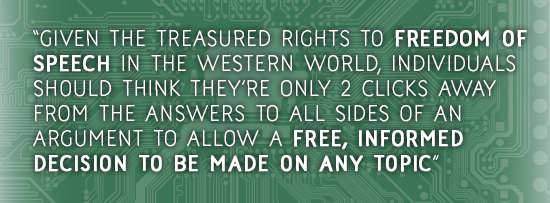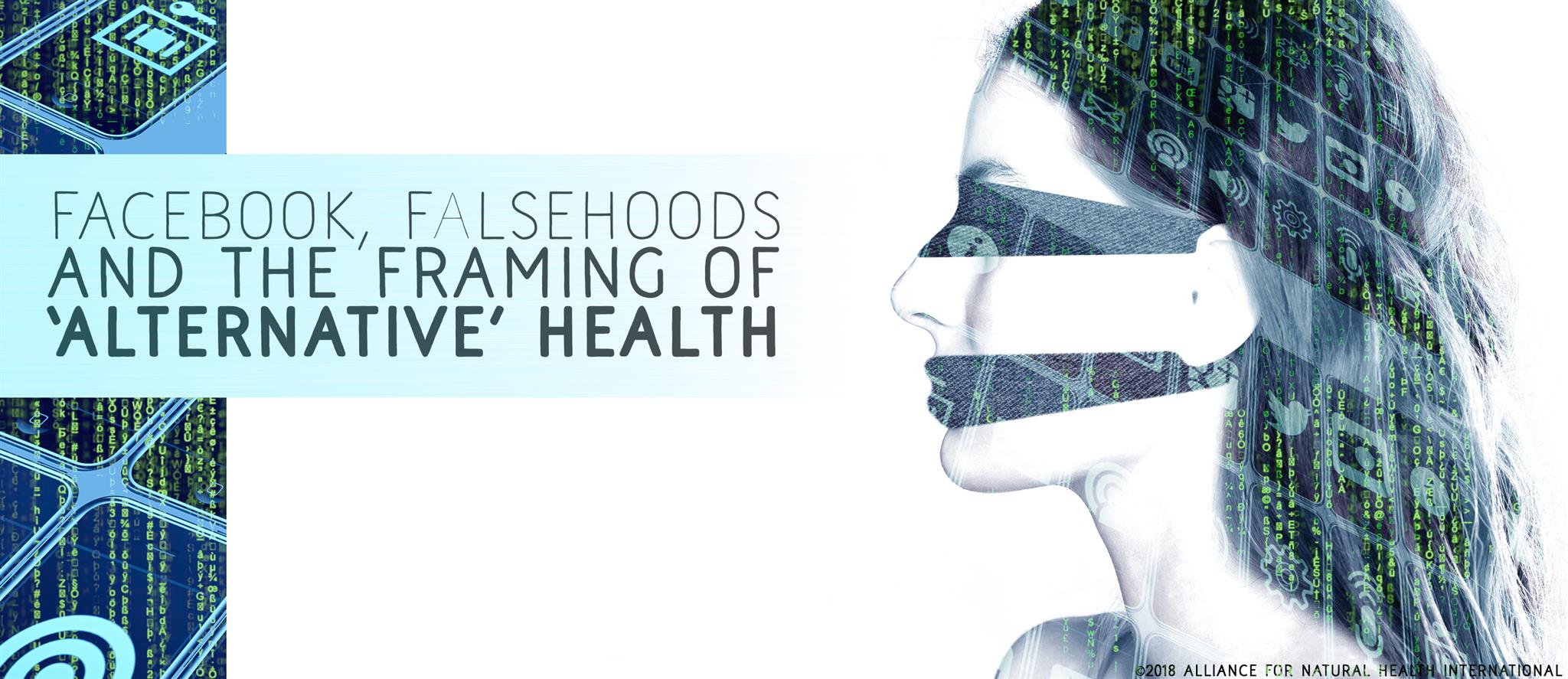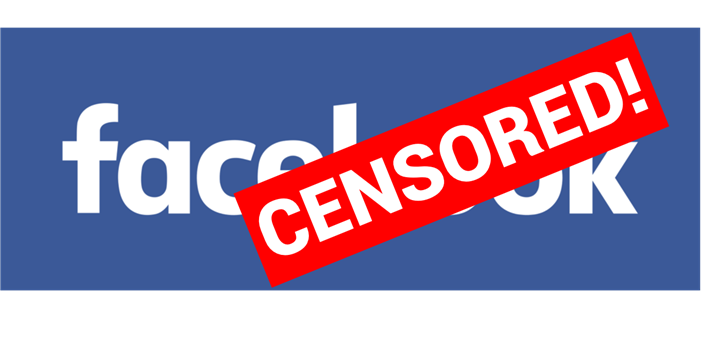Content Sections
By Charlie Jones (ANH-Intl communications specialist) and Melissa Smith (ANH-Intl outreach & communications officer)
As a result of recent mass purges, Facebook is alleged to have deleted over 80 pages dedicated to natural/alternative health and nature. Most of these pages contain views that oppose mainstream narratives. Severed from their millions of followers, the censored groups were by no means small, insignificant deviants.
Unsurprisingly, the affected natural health community was quick to respond, contesting what was perceived to be a concerted attack and censorship on important viewpoints that are largely intended to facilitate more informed decisions over healthcare choices.
Can we be so quick to point the finger at a social media giant’s potential agenda, or should we look a little closer at the online elephant in the room: collateral damage in the the regulatory battle against 'fake' news?
The blind leading the blind
The Internet pantheons, such as Facebook, Twitter and Google, are coming under intense pressure to self-regulate and police content. Among recent catalysts are terrorism risks and cyber-extremism, the whirlwind of allegations of Russian interference in the 2016 US presidential election and the influence of social media in the debate on vaccine safety and effectiveness. Data protection is another important factor.
From attempts to block hate speech in Germany, to the newly leaked guidelines for Facebook’s account deletion policy, the world is watching when it comes to the thin line of regulation and legality online.
In the face of a voluntary hearing before the US Senate earlier this year, Facebook CEO Mark Zuckerberg remarked, “I think the real question, as the Internet becomes more important in people's lives, is what is the right regulation, not whether there should be or not”. However, when it falls to choosing which content can be publicly displayed - and which can be guillotined - we might need answers to the famous Latin phrase, Quis custodiet Ipsos custodes? In plain English, who’s going to regulate the regulators?
Despite criticism, Facebook and Google, as private companies, can largely make their own rules. Decisions as to what’s acceptable are akin to the editorial rights of newspaper editors.
Importantly, they are not bound constitutionally to freedom of speech according to say the fundamental rights conferred by the US First Amendment. This may seem odd, but could be considered a liability protection in the case of objectively offensive or misleading material.
Garnering unwanted responsibility for tragedies, such as mob violence in Sri Lanka, Facebook – as well as its competitors – are understandably becoming very cautious and perhaps even over-zealous in their reaction to anything that could be seen as ‘offensive content’ on their respective platforms. Any regular Tweeter will be more than clued into the back and forth struggle it deals with daily with malicious accounts.
Facebook went as far as to remove a gargantuan 583 million accounts in just the first 3 months of 2018 alone – over a quarter of its entire user base. However, with such heaving, diversely cultured populations all logged in at the same time, emotionless, context-uncomprehending artificial intelligence (AI) modules are tasked with rooting out the wrong ’uns. Understandably, in the absence of sufficient knowledge and human intelligence and enquiry, things can sometimes get a bit fried. So do we trust these private entities armed with their AIs to do their own policing according to their own rules? Or would we be better off with a more impartial universal governmental ruling that applies censorship across every site? Or how about no rules - a full-blown Wild West of lawlessness? Left in private hands, how far is too far, and can this kind of autonomy or diktat be abused?

Tricking the deep mind
This year has seen the number of Internet users increase beyond a dizzying 4 billion people globally. Over a quarter of a billion new users came online for the first time in 2017 alone. With content shared en masse each second of every day, the amount of information moving through cyberspace is overwhelming - far more than individual humans could even begin to handle.
Enter AI. A key tool in any successful tech company’s arsenal against fake accounts and unwanted content. Whereas a human reviewer may be biased or uncertain about reported content, a machine acts as the perfect, faceless, no-compromise executor of the binary judgments we might struggle to make. But, as with any emerging technology, AIs that screen social media in the interests of our apparent safety are far from perfect. So much so, Facebook is hiring additional staff to cope with demand on secondary review of flagged content. But for the majority of reported posts, artificial systems can easily be manipulated.
A 2017 lawsuit accuses biotech giant Monsanto of hiring an “army of online trolls”. The idea was to shift public perception using the company’s ‘discredit bureau’ and a plethora of positive comments from fake accounts. It would also help Monsanto combat a practice known as ‘data poisoning’. This involves the intentional encouragement of an AI system to make the wrong decisions – an occasional hobby among online hackers. For social media sites such as Facebook, mass reporting content of similar nature with numerous accounts can lead to the machine relearning that content as offensive or misleading, effectively blacklisting it from the service. Get enough sockpuppet accounts under your belt, you may even be able to outlaw your competitor’s business for a good few weeks, giving you perfect time to scoop up the custom.
Remember how Facebook deleted 583 million accounts this year already? It would seem they’re a little worried about this too! So, with the ease of these practices in mind and the colossal burden of individually checking every single claim, it’s quite possible that such AI-driven algorithms and machine learning are also being tweaked for commercial gain – or rather – competitor burial.
In this light, we return to the question: is there a conspiracy to target alternative health sites, or have these sites been caught in the shrapnel linked to the ongoing, larger war against ‘fake news’? Should Facebook and others of its ilk shoulder the blame for an unstable system, or should we as users be taking much more responsibility for the content that we share? Does it also make sense to boycott?
From speculations of a vegan stitch-up, to cries of intentional conservative censorship in America, it's hard to discern the biggest drivers or conspirators or whether any of it represents any pattern of attack at all. What it does illustrate, however, is the incredibly grey, shifting line between what – and what can’t – be promoted.
The price of community
The Internet was originally envisioned to be a universally accessible, friendly system that allowed limitless access to information about every subject imaginable. Given the treasured rights to freedom of speech in the Western World, individuals have long been encourage to feel they’re just 2 clicks away from answers to all sides of an argument. This facilitates education and free, informed decision-making on any topic. That might range from engaging in a heated chatroom or forum debate or being nourished by an exquisitely written guide about your obscure hobby. For those courageous enough with their search bar, you might even find a 30-second home video of a whale-dressed man (Ed: pardon the pun) dancing in his room to Tina Turner! The bottom line is, the Internet is meant to serve as a place with no borders or laws. If you need an answer, just Google it. And it’s no surprise that more and more people are using the Internet, Google and social media to help inform themselves on the things they regard as more important than whale-dressed men. More and more are using the Internet as a means of informing healthy lifestyles or healthcare choices. Yes, we have reached the era in which Dr Google may have more influence than the family doctor.

Altered virtual reality
We tend to believe access to these portals is entirely free. Of course, financially, in direct terms, there isn’t a charge unless you are lured by a targeted advertiser. But what actually happens is akin to a miniature bloodletting session every time you go surfing. This comes in the form of data freely given, rarely considered. Each time we use the Internet, we give up surprisingly large amounts of information about what we like, who we are, where we are and certainly what we think. Whether we realise it or not, we’re increasingly being faced with an ever-narrowing view of easily accessible information across the main media platforms as content is increasingly tailored and moulded to each one of us — individually. This not only can serve to blinker us from open debate due to our own searching habits, but can actually lead the companies in charge to decide what we should or shouldn't be exposed to. Consider extreme cases of controversial overturns, or the celebrity scandals of recent years. If you’d been pigeonholed as someone who was to be exempt from news of terror attacks across the globe, would you forget they exist – or even begin to scoff at the notion? The thin grey line doesn’t just represent censorship. It represents a common lack of realisation about how faceless (Facebook?) others are controlling how each one of us sees the world around us.
Is it time to log out?
Is there a work-around? Can we escape the clutches of rogue AI’s and backhand agendas, especially if we want balanced information about how we should manage our health via natural means? The good news is alternatives to Facebook, Twitter and Google are appearing and it’s up to us to make that change. After we launch our new website that's deep in development as we speak, we'll let you know what we're doing in that department. It is nevertheless interesting that user time actually declined on Facebook by the end of 2017. More and more individuals including Generation Z teens, are starting to stray from the cultural phenomenon that made the millennials the first human generation to become addicted to cyber-reality.
From our own ongoing analysis, we can’t be sure with any certainty if there is a planned, definitive attack on natural health on social media platforms. But one thing’s for certain: if the likes of Facebook continue on the path they’re headed, they can no longer be trusted as an impartial platform for the sharing of balanced news and information.
Cyberspace is vast, as being ever-growing and ever-changing. Sitting tight in an established cell with its skewed opinions, data poisoning, accusation and restriction, the walls of Facebook and its ilk are closing in on us at an ever-increasing pace. In the process, these private corporations are restricting our fundamental freedom to freely express ourselves. We’re told they’re trying to protect us from terrorism. That’s nice of them, but most of us have woken up to the fact that a more likely motive is the protection of certain corporate interests.








Comments
your voice counts
30 August 2018 at 12:22 am
While FaceBook, Google, and other large social media companies are privately owned, so is AT&T. They are all private, but what would happen to phone service if AT&T, Verizon, and other large phone companies decided to only allow politically correct discussions to go on by their customers? All these companies help individuals and businesses to conduct their business, and anyone, be it Alex Jones or Mike Adams or any other alternative voice that is silenced is essentially shut down and out of business. Mike Adams has begun an alternative video sharing site Real.Video to compete with YouTube, and a private individual has begun MeWe.com, which is currently the most successful alternative to FaceBook. MeWe doesn't track of censor anyone who uses it as long as members are polite and don't troll. And it is easy enough to block anyone.
So I suggest if ANH is having trouble with FaceBook, in just in case they ever block ANH, that it would be a sensible idea to join MeWe.com. This is not a commercial site but a knowledge sharing site.
30 August 2018 at 8:27 am
Thanks for telling us about MeWe. It's always good to know what all the different options are in case they are needed.
Warm Regards
Melissa
30 August 2018 at 12:54 am
You saw the PR releases on Russians behind the anti vax movement?
That can then make the 'circuit' for blocking any vaccination safety concerns - regardless the charges are absurd.
I would get off facebook - or keep a minimal presence linking to something less proprietary and less inclined to run on mining and selling user data.
Who owns the hardware and software that the Net runs on? Gatekeepers such as Google and Facebook can effectively hold a mainstream bubble and various measures effected to limits, undermine and disinfo or smear anything critical that becomes influential. And at some point making extreme examples to scare all but the most dedicated from speaking out.
However, a larger alliance needs to be forged for information sharing and our quality of communication needs to be brought into a truly disciplined intent for healing - because resort to expressing emotional reaction instead of passionately focused true witness, will be used as justification. (Note to self - infiltration or troll bots will do their best to make this seem so anyway). But also to be very vigilant as to how we frame our thinking and our communication. Orwellian doublespeak is normal currency but serves to engineer our own thought, perception and choice.
I understand that in seeking to influence government and corporate bodies, ANH feels it has to use the jargon. But the jargon is coined to mask sickness management as healthcare, teaching - and promoting foods and drugs and toxic exposures to reinforce that human life is a disease and able to run strategic campaigns to influence by deceit. implement by stealth, and effect by force of laws made without executive oversight.
An image comes of a corpse in a mortuary - but just before it is to be disposed of there are signs of life AND they are recognised and the being is attended instead of a body disposed. We presume we are alive but how much is simply conditioned reactive habit that we simply don't wake up from?
There is health and there are many ways to align in health. The 'alternative' is the predicate of sickness as the justification for interventions that block health to then justify the power to intervene, censor, limit and control all the parameters of humans according to rules and parameters and goals that protect the sickness and justifications and power.
Regardless our symptoms - why not align in health - be out from wholeness and joy such as each moment and day gives opportunity for - and grow from a predicate or indeed faith in wholeness of being - regardless the evidences of sickness seen as anything BUT a call for healing in wholeness and NOT just the management or blocking of symptoms of challenge or unsupport for OUR narrative control.
If we open a greater honesty we will find a convergence or synchronicity of cause (inner thought, definition and belief) and effect (interpreted or perceived experience of self and world).
Running as a fear of sickness and death is not living as a love and honouring of life - even is some of the outer behaviours seem to match. Of course most of what I am addressing is mostly UNconscious relative to a 'mind capture' of the attempt to live out of true and 'get away with it'. Much of technological development has been tacitly running as a way to insulate ourselves (displace or dissociate) from what Life Is.
But all abilities CAN be turned to serve a wholeness (in each and all) rather than 'save' a holeness' from the uncovering of a fundamental mis-identification.
There IS a true choice because we made a false one and believed it true, albeit this hidden from our surface or waking awareness.
And if we should die within a living choice - we are yielding to Life not death. For Life is through us and to us but not bodybagged as an autonomous unit to operate an anti-human agenda. That is a bad habit that runs deeper than we like to look. But only a habit noticed and owned, can be changed by choosing to act a different choice persistently and consistently enough to grow a new habit.
And... should be be denied modalities of treatment - be sure there are other avenues and be open to the prompts to find and follow them. All of this requires a quality of support in Being - that may come from inner or outer agencies of relationship - but Life is a relational intimacy of being - to accept and extend to all who live. Give only as we would in truth receive. And receive and perceive through your highest discernment so as not to be phished of your true nature by a belief thief.
Make a (user contributed?)links page - with disclaimers for that you may not agree with or support what any other site does or says - for websites or some contact for those being censored. Or support another portal to help their voice be findable?
30 August 2018 at 8:30 am
Thank you as always for commenting Brian and providing us with your insights.
Warm Regards
Melissa
30 August 2018 at 6:53 am
After around 20 years of stable traffic from Google searches (around 1500/month) for our Natural Health site middlepath.com.au the traffic dropped to around 30% (~500/'month) at the beginning of August. No content changes were made and so it seems obvious Google has made some alterations to their algorithms which effectively penalise us.
30 August 2018 at 8:34 am
Hi Fergus, thanks for letting us know about the problems you're experiencing with Google. Let's hope it's something simple rather than sinister! We will be watching to see how things develop over the coming months.
Warm Regards
Melissa
30 August 2018 at 8:53 am
Cyberspace - the next war zone.
As soon as enough privateers setup their own server bases with independent social media platforms and search engines etc we'll see the big companies with a monopoly either buy out the smaller companies or wage cyber war on them destroying servers and reputations.
We need to stop being complacent that all is well and take a more proactive approach to learning what goes on in the cables, server rooms and the software.
AI is a potential benefit but also and scary threat to humanity and our future.
30 August 2018 at 10:10 am
Hi Paul, thanks for taking time to share your thoughts. It's an entirely possible scenario sadly, let's hope that people will start to wake up to what's happening and become more proactive.
We will continue to share information designed to help people make informed decisions in whatever way we can!
Warm Regards
Melissa
31 August 2018 at 7:12 am
It's not just censorship by social media platforms. As the CEO of a startup selling a natural nutritional supplement, I'm well aware of the headwinds faced by those with views (or products) that oppose or fall outside of mainstream narratives. An example ANH readers may not be aware of is the restrictions natural supplements companies face from many payment processors (such as Stripe), who don't allow them because they classify all supplements as 'pseudo-pharmaceuticals', and while they don't fall within obvious prohibited categories such as gambling and pornography, they just happen to fall within the category "Products or services that are otherwise prohibited by our financial partners".
So, while 'actual pharmaceuticals' such as opioids are permitted, our product, a natural adaptogen that has over two thousand years of safe and effective use, is not.
As you say in this excellent article with respect to social media, it's hard to say if this is part of a planned, definitive attack on natural health, but there is no question that national healthcare systems, regulatory bodies, pharmaceutical companies, and global financial systems are inextricably linked, and I can't help but wonder how many board members of Stripe (and other payment gateways') financial partners also sit on pharmaceutical company boards.
03 September 2018 at 8:56 am
Thanks for taking the time to comment Forrest and share your experience with us. It certainly makes you wonder just how far the influence of Big Pharma and other corporatocracies reaches. Sadly the information ordinary citizens can easily access is becoming more and more sanitised, something we will continue to oppose by campaigning and providing information to allow properly informed decisions to be made by all.
Warm Regards
Melissa
31 August 2018 at 10:40 am
Hi Guys, I feel you are at last moving to a more realistic approach rather than trying to persuade the existing system to be reasonable. All large corporations from Microsoft to FaceBook to GSK and everyone in between eventually come under the control of the Deep State Military/Medical Mafia. Good luck to MeWe.com if it thinks it can stay out of its clutches. TeleGram is doing a good job for the time being.
As I have said for many years the 'medical mafia' will never be convinced that natural health is the way forward and is a waste of time and energy. Goldman Sachs sent a report out some weeks ago urging all pharma companies not to research cures and they said: In a report entitled “The Genome Revolution”, Goldman wrote:
“The potential to deliver ‘one shot cures’ is one of the most attractive aspects of gene therapy, genetically-engineered cell therapy and gene editing. However, such treatments offer a very different outlook with regard to recurring revenue versus chronic therapies. While this proposition carries tremendous value for patients and society, it could represent a challenge for genome medicine developers looking for sustained cash flow.
The Quoted As An Example
Gilead Sciences’ treatments for hepatitis C, achieved cure rates of more than 90 percent. The company’s U.S. sales for these hepatitis C treatments peaked at $12.5 billion in 2015, but have been falling ever since. Goldman estimates the U.S. sales for these treatments will be less than $4 billion this year.
“GILD is a case in point, where the success of its hepatitis C franchise has gradually exhausted the available pool of treatable patients. In the case of infectious diseases such as hepatitis C, curing existing patients also decreases the number of carriers able to transmit the virus to new patients, thus the incident pool also declines (and make more profit).
The Moral Of The Story?
Don’t Trust the 'Medical Mafia' (Doctors, Charities and especially Drug Companies). They are being advised by Goldman Sachs that they can make more profit by getting patients hooked on drugs rather than with a cure that reduces their profits.
Only a legally allowed parallel system to the Medical Mafia offering Health Contracts to help people get healthy and stay healthy will prove the 'Medical Mafia's' failings.
Campaign to get the 'Medical Mafia Monopoly' lifted and ban them from using the fake phrase, 'Health Care', and they can call it what it really is, 'disease care'.
03 September 2018 at 8:58 am
Thanks for your insights Robert. It's sobering to read such reports as they underline, as you say, that it just isn't in Big Pharma's interest to 'cure' people. The longer people are sick the better for them and their profits. As we always say - Follow the money!
Warm Regards
Melissa
04 September 2018 at 10:51 am
This is where you can coverage, PR and get TV and radio interviews, with a copy of the Goldman Sachs report in your hand that will shock the public.
Only a legit organisation such as yourselves can stand up for the public. If not you then, who?
Your voice counts
We welcome your comments and are very interested in your point of view, but we ask that you keep them relevant to the article, that they be civil and without commercial links. All comments are moderated prior to being published. We reserve the right to edit or not publish comments that we consider abusive or offensive.
There is extra content here from a third party provider. You will be unable to see this content unless you agree to allow Content Cookies. Cookie Preferences